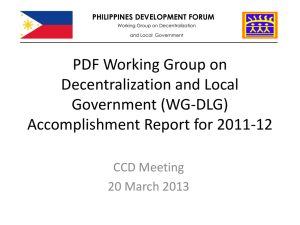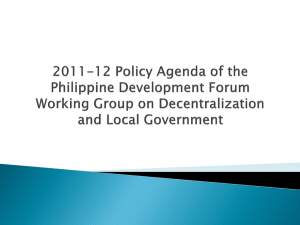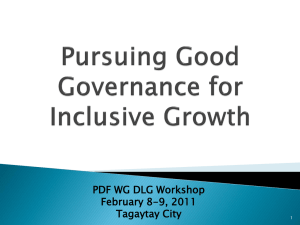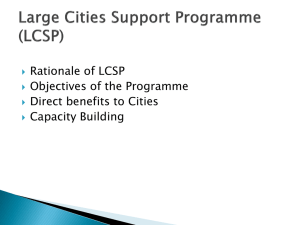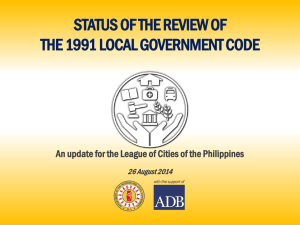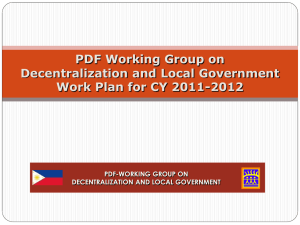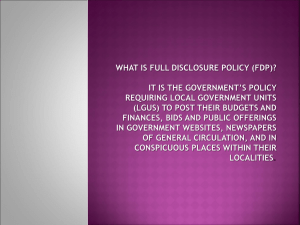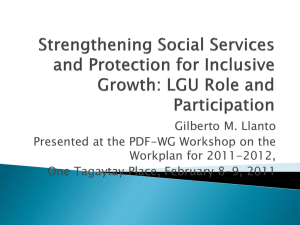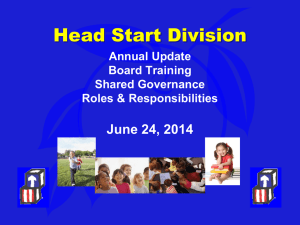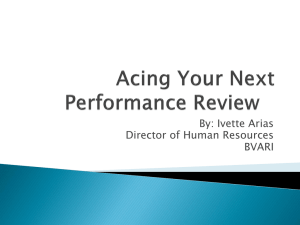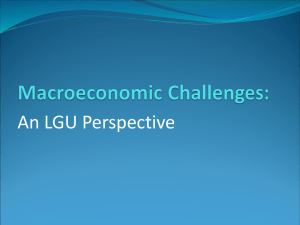Accomplishment Report - Philippines Development Forum
advertisement
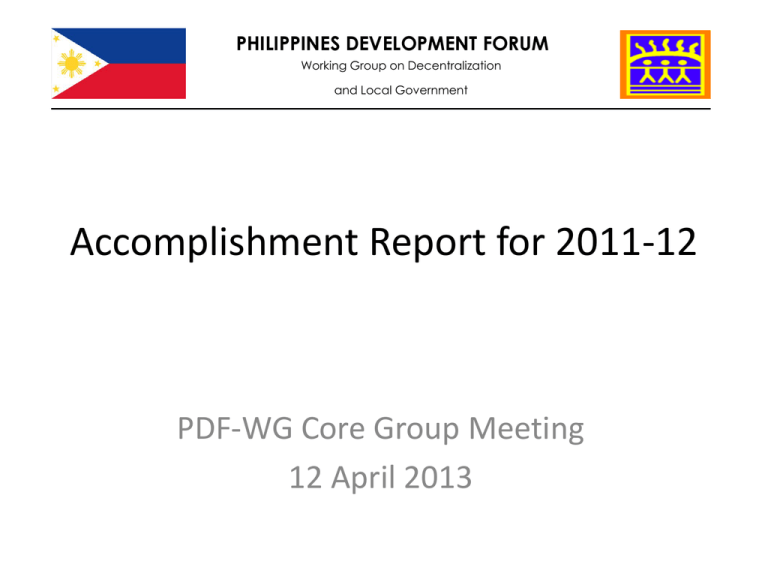
PHILIPPINES DEVELOPMENT FORUM Working Group on Decentralization and Local Government Accomplishment Report for 2011-12 PDF-WG Core Group Meeting 12 April 2013 Overview of PDF Working Group • The importance of decentralization in achieving development outcomes led to the constitution of the PDF-WG in 2005. • PDF-WG is a venue for discussing policy and achieving consensus on policy reforms and priorities in local governance. • In 2010, the Philippine Decentralization and Local Government Trust Fund (DIALOG TF) was established as a mechanism for pooling resources to support the PDF-WG Work Plan. PDF-WG Members WG-DLG Role Institution/Organization Convenor Department of Interior and Local Government (DILG) Co-convenor World Bank Members National Government Oversight Agencies: Department of Budget and Management (DBM), Department of Finance (DOF) and the National Economic Development Authority (NEDA) Local Government Leagues of Provinces, Cities, and Municipalities of the Philippines; Liga ng Barangay National Secretariat; Union of Local Authorities of the Philippines Development Partners: ADB, AusAID, EU, Agence Francaise de Developpement, GIZ, JICA, KFW Development Bank, Embassy New Zealand, UN organizations (UNDP, UN Children’s Fund, Population Fund), USAID, Spanish Agency for International Development Cooperation (AECID) PDF-WG Work Plan 2011-12 Development Agenda Three broad development agenda of the WG-DLG were: 1. Improving Fiscal Autonomy for Local Development 2. Promoting Good Local Governance 3. Accelerating Local Economic and Sustainable Development Development Agenda and Goals Outcomes 1. Improving Fiscal Autonomy for 1. More efficient local fiscal policies and procedures Local Development 2. Increased own-source revenues Goal: LGUs with improved fiscal 3. Improved access of LGUs to financing capacities for accelerating local 4. More efficient allocation of expenditures development 5. Improved revenue management capacity 2. Promoting Good Local 1. Meaningful engagement of people’s organizations in Governance local governance 2. More transparent and accountable local operations Goal: Accountable LGUs exercising 3. Improved local government performance transparent and participatory local 4. Devolution models identified for replication governance 5. Improved capacities of LCEs 6. More efficient local service delivery 3. Accelerating Local Economic 1. Streamlined business registration system and Sustainable Development 2. Improved LGU capacity to encourage investments 3. Better management of local public enterprises and Goal: An enabling environment for utilities local economic and sustainable 4. Boost economic development through road development and effective delivery of maintenance basic services. 5. Disaster resilient LGUs and communities PDF-WG Work Plan 2011-12 Structure: Basic Results Framework WG-DLG Development Agenda or Goal Desired Outcomes Actual Outputs/Deliverables of Projects/Activities Evaluation Process for Accomplishment Report for 2011-12 1. Established the structure of the report to follow the 2011-12 Work Plan framework 2. Defined accomplishment and assess progress. This was challenging since outcomes: – had no identified benchmark indicators – were not empirically defined. Because of this accomplishments are defined as completed projects or partially completed for projects with several components. 3. Drafting the accomplishment report: – – Discussed the development agendas, highlighting completed projects attempting to link goals to policy efforts Presented accomplishments and ongoing efforts in more detail according to desired outcomes Accomplishments for Development Agenda 1: Improving Fiscal Autonomy for Local Development GOAL: LGUs with improved fiscal capacities for accelerating development Outcomes Activities/Projects Increasing own source revenues • Development of local business taxpayer database • Guidelines for the use of presumptive gross sales figures to estimate business tax liability • Facilitating and monitoring compliance on updating of the schedule of market values (SMV) of real property and the collection of idle taxes. Increasing LGU access to external financing through borrowing • Strengthening the Municipal Development Fund Office (MDFO) capacity to provide credit information and development financing More efficient allocation of resources • Improving LGU utilization of Local Development Fund More efficient local policies and procedures • Enhancement of the e-SRE modules and capacity building for treasurers Accomplishments for Development Agenda 2: Promoting Good Governance GOAL: Accountable LGUs exercising transparency and participatory local governance Outcomes More transparent and accountable local operations Activities/Projects • Institutionalize the public disclosure of documents for the Full Disclosure Policy (FDP) and the creation of the FDP web portal • Technical assistance and analytical activities in support of national government programs that strengthen incentives for better local governance and performance such as the Performance Challenge Fund (PCF) and the Seal of Good Housekeeping (SGH). Promote constructive engagement of civil society • Capacity building of CSOs to engage in local special bodies, promoting volunteerism among citizens and CSOs, and mapping and profiling of CSOs nationwide. Accomplishments for Development Agenda 3: Accelerating Local Economic and Sustainable Development GOAL: To create an enabling environment for local economic and sustainable development and effective delivery of basic services Outcome Projects/Activities Streamlined business registration system • Technical assistance for scale-up of business permit and licensing systems (BPLS) among LGUs Improved LGU capacity to encourage investments • Technical assistance and capacity building to promote local investment and competitiveness through draft policies on Local Economic Development • Support sustainable inter-local cooperation through the Local Governance Support Program-Local Economic Development alliances Disaster resilient LGUs in communities • Technical assistance to vulnerable LGUs to assess vulnerability to DRR and CC and include these in the Comprehensive Development Plan General Findings – Overall Accomplishments • A total of 32 projects/activities were completed/partially completed out of a total of 37 projects in the 2011-12 Work Plan: Development Agenda # of Projects/Activities (% of 32 projects) 1. Improved Fiscal Autonomy for Local Development 12 (37.5%) 2. Promoting Good Local Governance 10 (31.25%) 3. Accelerating Local Economic and Sustainable Development 10 (31.25%) General Findings – Overall Accomplishments • Twenty-eight out of 32 accomplished projects were directed to improving the policy environment • The impact of accomplishments on development outcomes are not yet observable since: – 6 are pilots or for roll-out (e.g. e-SRE, Local Business Taxpayer Database, PBGS, BPLS, Methods for Presumptive Business Tax Liability, BCMA) – 8 are draft policies (e.g. Local Economic Development and Local Investment Promotion) – 2 limited scope/coverage (e.g. Bicol-CARAGA and Luzon-Visayas) • The impact of accomplishments in promoting good local governance were more immediately observable (e.g. FDP and PCF) primarily because these were high-level GOP priorities General Findings – Work-plan Monitoring and Reporting • Though clear and easy to understand, the work-plan lacked the information to identify and empirically measure progress because: – the desired outcomes had no empirical measure – there were no benchmarks indicators • Secretariat lacked a clear-cut strategy and regular effort to update the Work Plan General Findings – Working Group Coordination • Strengthened coordination among members • Consensus for common positions and recommendations was facilitated
